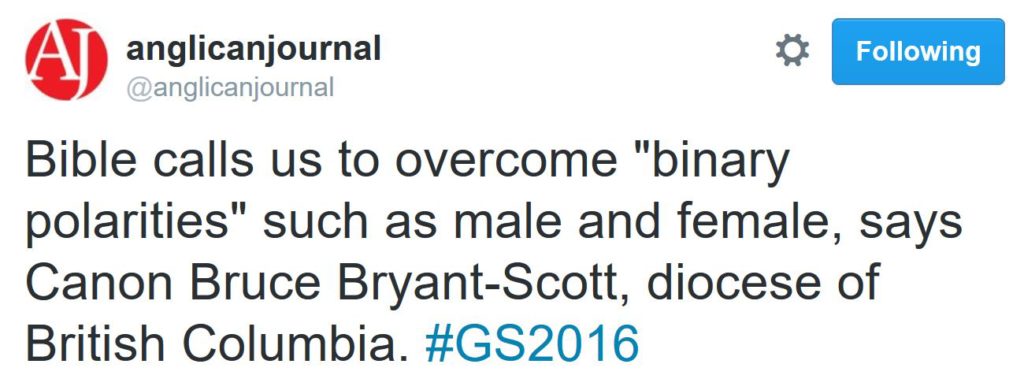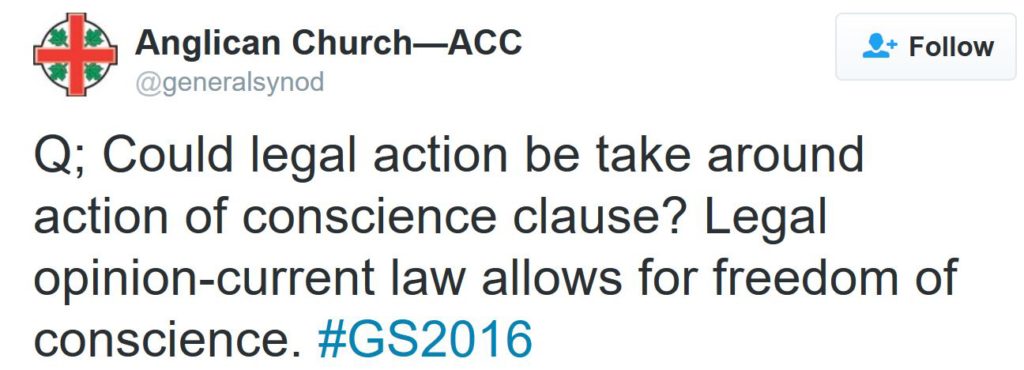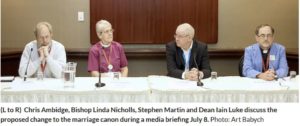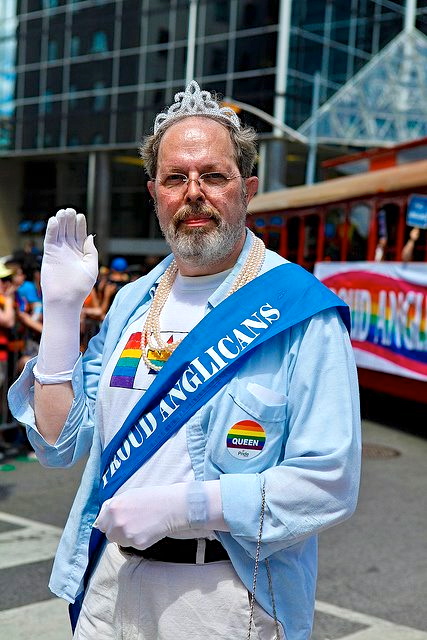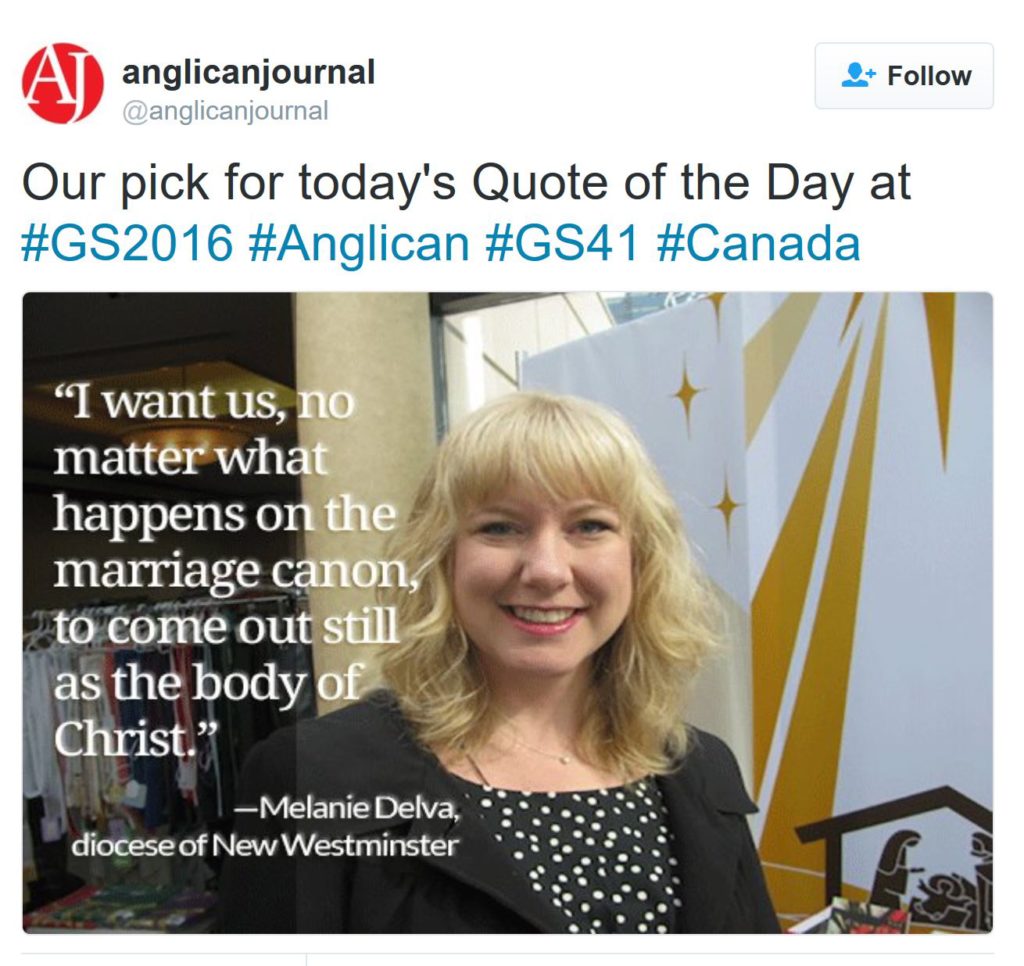Unsurprisingly, changes to the marriage canon occupy a significant portion of the address.
Also unsurprising is that there is a clear undercurrent that Hiltz favours the change. Hiltz would have us think that the important thing is not so much whether same-sex activity aligns with how God expects us to behave as revealed in the Bible, but whether the two sides can hold together and disagree with charity. Truth must be subservient to a satisfactory outcome of ecclesiastical transactional analysis: the disagreement must be good disagreement, then we will all be OK together as diversity prayers waft heavenward in clouds of smudging smoke. No-one will leave and clergy pensions will be secure.
Needless to say, that is all nonsense: both sides can’t be right and, since this time the issue is marriage itself not just blessings, there will be less “core doctrine” wiggle room. The disagreement will be vigorous, divisive and probably bitter. Perhaps that is “good disagreement” in that it would at least be honest..
With you, I am aware that for many throughout the Church, the issue of this Synod is the proposed amendment of the Marriage Canon to make provision for the solemnizing of same-sex marriages in our church. This matter is before us as a result of deliberations on Resolution C003 at General Synod 2013, passed in our accustomed way of voting as bishops and as clergy and laity voting together; and then by request of each of the Orders voting separately – bishops, clergy, and laity. This resolution directed the Council of General Synod (COGS) to bring forward the necessary amendments to the Marriage Canon. As you will hear in some depth this evening, COGS appointed a Commission on the Marriage Canon to address the request. The commission honoured in full the amendments to the original Resolution C003, including broad consultation across our church, with the Anglican Communion and within ecumenical circles in the Church Catholic.
The commission produced a report entitled, “This Holy Estate” which included substantial reflection on the subject of Covenantal Love in a marriage relationship and an invitation to consider some models for understanding same sex marriage. The Report was presented at the September 2015 meeting of the Council of General Synod and commended for study throughout the Church. At the special meeting of the House of Bishops in February, I did a cross-country check as to how the Church was engaging the report diocese by diocese. It appeared that the level of engagement had been nowhere near what had been hoped. I regret that and to be honest it has left me wondering what that says about our Church.
I am grateful that over the course of the next couple of days, members of Synod will have opportunity in Neighbourhood Groups to talk about the report.
I want to make an appeal to Synod that in these conversations and then in debate, we be especially and gently mindful of all those whose lives and loves and longings we are discussing – all those who are lesbian, gay, bisexual, transgendered, and questioning. They are members of our families and extended families; they are our neighbours and our friends. They are members of our parishes. They are our clergy. They bear on their brow the same cross all the rest of us do. They pray with us. They hear the Word of God with us. They break bread with us. They are sent like the rest of us to live by that ancient call, that great commission, “You are my witnesses”.
I hope we will all enter into these conversations in the spirit in which they have been designed. I trust they will draw us together in a good way, preparing us for the consideration of the Resolution on Monday, July 11. I take this opportunity on behalf of Synod to thank our Chancellor for the time and care he gave in preparing a memo for all members of Synod with respect to “Issues in Dealing with Resolution A051”. Drawing on the Declaration of Principles in the Handbook of the General Synod and the Rules of Order and Procedure with which we carry out our work, the Chancellor helps us understand all that can happen to a resolution once it is before the Synod. The memo speaks not only to how the Synod handles the resolution, but also to things we need to bear in mind should the resolution pass or not. The Chancellor will speak to his memo at the outset of our legislative session on Monday. I am convinced as I am sure many of you are that it will be enormously helpful with respect to our need for clarity in order and procedure.
The companion absolutely necessary to clarity in this matter before Synod is charity, charity one toward another. I recognize that much is at stake in our deliberations, including how we understand the authority of the word of God, the nature of tradition and the defining of doctrine. How we understand what constitutes responsible pastoral care of LGBTQ persons. What is at stake for some is our Church’s commitment to dignity, inclusion and fair treatment of LGBTQ persons in our midst, inclusion meaning full and equal access to all ministrations of the Church including the solemnizing of their marriages.
For some, an issue at stake is our capacity to remain in communion with one another in the face of deeply held differences of conviction over this matter. “How big is our Church?” was a question posed to me in recent days. It was quickly followed by two more. “How committed are we to making room for one another? Can there be in the spirit of pastoral generosity a place for us all?”
For some an issue at stake is the catholicity of the Church and the impact of decisions we make on our relationships with other churches within the Anglican Communion and with churches with whom we are in ongoing or emerging dialogue.
For some what remains at stake is a continued wrestling with the conclusion of the 2005 St. Michael Report that “the blessing of same sex unions is a matter of doctrine” (para 42), but “not a matter of what is often referred to as core doctrine in the sense of being creedal, it is a matter of doctrine that does not hinder or impair our common affirmations of the three historic creeds” (para 42). The commission concluded also that such blessings are not “a communion breaking issue”. For some what is at stake is their continued wrestling with the significant dilemma named in the St. Michael Report and within which the Church is deeply immersed (nationally and internationally). The dilemma is articulated in the following questions;
Is it theologically and doctrinally responsible for one member church of the Communion to approve a course of action which it has reason to believe may be destructive of the unity of the Communion?
Is it theologically and doctrinally responsible to accept unity as the value which transcends all others, and therefore for a member church of the Communion to refrain from making a decision when it believes it has an urgent gospel mandate to proceed?
In our deliberations about this matter which is clearly divisive, I hope we can embrace the principle of what the Archbishop of Canterbury calls “good disagreement”—that is, disagreement in which we will not dismiss, despise, or demonize the other, but rather turn to one another with a commitment to speak graciously, listen intently and learn of the perspective from which another thinks. While we acknowledge the strain in our relationships, let us not get to a point where any of us says to another “I have no need of you” (1 Corinthians 12:21). On the contrary, let us never forget our call “to make every effort, to maintain the unity of the Spirit to the bonds of peace”. (Ephesians 4:3)
My appeal to the members of this Synod is that we exercise holy manners, conducting ourselves in such a way that reflects that ancient call, that great commission “You are my witnesses”.


